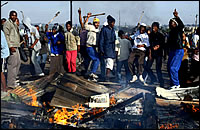From ‘Proudly South African’ to ‘Proudly Xenophobic’ ?

 |
| Xenophobic horror: A symptom of lack of a clear migration policy |
Democracy is not alien to the African context. At the core of a democratic order is respect for choice and freedom. Klaus Nurnberger in the book A Democratic Vision for South Africa argues that for democracy to thrive, there is need to uphold human dignity and equality.
The recent spate of xenophobic horror and bloody violence in South Africa is a cause of concern to all those who love Africa and are concerned about transforming the African dream into reality. The independence and self determination of South Africa was celebrated less than a decade ago as the birth of a rainbow nation, led by the icon Nelson Mandela. Is South Africa still the same South Africa we all loved and celebrated? In the next two years, the country will host the first ever soccer world cup on African land, an event that will attract more than a million international visitors. How will South Africans treat the foreigners given such precedence on treating fellow African brothers coming just across their borders?
This xenophobic horror is a symptom of lack of a clear migration policy on the continent. Intra-Africa migration has never occurred within any strategic policy framework from the donor or host countries, hence the presence of many Zimbabweans doing menial jobs in South Africa, yet they are trained Doctors, Teachers and Engineers just to name a few. These people would have contributed to the South African economy by plugging the skills gap. This shows the policy bankruptcy of African leaders in failing to locate issues of strategic concern on the continent.
As a Zimbabwean, I am deeply saddened to learn that my countrymen are among the worst hit by the xenophobic violence. The movement of Zimbabweans into South Africa has occurred in a serious policy vacuum notwithstanding it is a symptom of a socio-economic and political melt down. The movement has been characterized by denial from both the Zimbabwean authorities and South African authorities, with the latter denying the emigrants voting rights.
The unfortunate Zimbabweans have been caught up in the no-man’s land with no place to shelter from bullets. The South African authorities have resorted to en masse deportation of Zimbabwean nationals without a clear policy of detecting and handling issues case-by-case and/ or based on special circumstances. Hooligans and unruly South Africans have extended this unfortunate state based doctrine of large-scale deportation of the skilled, professionals and unskilled Zimbabweans based in South Africa to proudly xenophobic.
In the name of African solidarity, the doctrine of sovereignty and the principle of non-interference, the South African authorities have refused to offer a blanket refugee status to Zimbabweans fleeing the socio-economic and political melt down in their country often opting to call it a manageable crisis. As a result of this blunt policy, Zimbabweans have endured a harsh legacy that has coincided with the bloody campaign against Zimbabweans who voted for the opposition Movement for democratic change (MDC).
The South African government needs to re-look its foreign policy on Zimbabwe if the ‘Proudly South African’ brand is to get a decent position in the mind of global citizens. And indeed Drucker was right that only the customer creates value. South Africans only have themselves to blame if they let the rainbow nation drown to the levels of failed nations by shouting ‘Proudly Xenophobic’ to the world.
